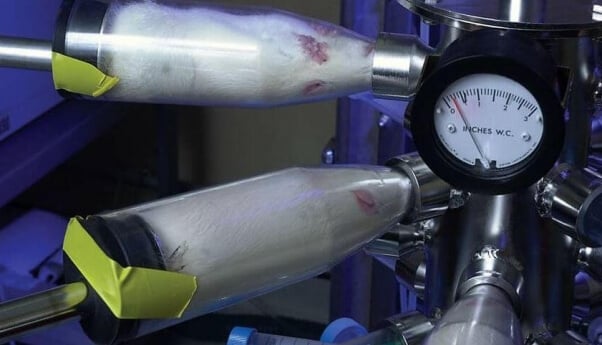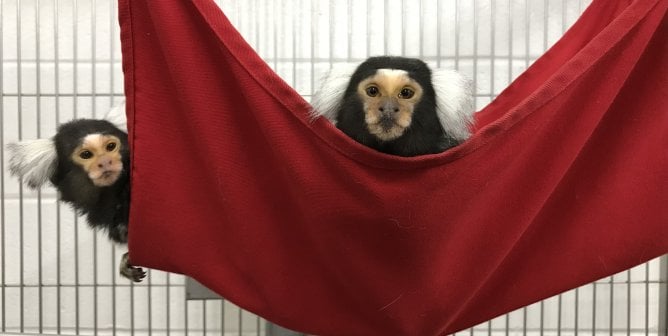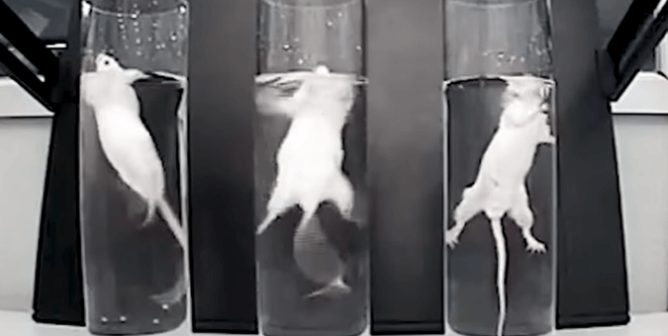PETA Funds Non-Animal Methods
“The science PETA is sponsoring is critical to the elimination of animal use. PETA puts its money where its mouth is and has steadfastly supported better use of science to reduce reliance on animal testing.”
—Dr. Gilman Veith, Former Chair of the Board, International QSAR Foundation
PETA has a long history of working closely with government agencies, industry, and educational institutions to push for humane, effective non-animal tests. Our efforts include directly funding the development and validation of these tests. Validation is the process by which the reliability and relevance of a test method is established, and it is required before national and international regulatory agencies will adopt that method (even though no such scientific validation was required for many, if not most, currently accepted animal tests).
To date, PETA entities worldwide have contributed millions of dollars toward the development and implementation of non-animal test methods and other alternatives to animal use.
However, our funding of animal-free testing is dwarfed by the billions of dollars that are wasted on misleading animal experiments by the federal government, companies, universities, and many health charities, which should instead devote their resources to human-relevant, non-animal test methods.
Skin Testing
Skin allergy or sensitization testing is commonly performed for a wide variety of chemicals, including those found in pesticides, cosmetics, medical devices, and pharmaceuticals. In the first validation of a non-animal method funded by an animal protection organization, PETA U.K. awarded more than $150,000 to CeeTox, Inc., for the validation of a non-animal skin allergy test for cosmetics, medical device extracts, and other substances.
In animal tests, experimenters repeatedly smear chemicals onto the skin of between 32 and 80 guinea pigs or between 16 and 60 mice or inject the substances into their bodies before killing them. These tests take weeks to conduct, while the non-animal test takes only days to complete.
PETA U.K. also provided funds to support the validation of a non-animal skin irritation test method that was subsequently accepted by the Organisation for Economic Co-operation and Development (OECD) and can replace the use of rabbits in dermal testing worldwide.
Inhalation Testing
To predict the effects of inhaled chemicals on humans, animals—often rats—are confined to narrow tubes and forced to inhale the test substances for hours or months before being killed. In addition to ethical concerns, the anatomical and physiological differences between species limit the test’s relevance to humans.

The PETA International Science Consortium Ltd. awarded researchers nearly $250,000 to develop and test EpiAlveolar—a 3-dimensional lung-tissue model made of human cells. This model can be used to study the effects of inhaling different kinds of substances, such as nanomaterials, chemicals, pathogens, (e-)cigarette smoke, and other respirable materials, instead of using animals.
The Science Consortium also donated in vitro equipment—worth hundreds of thousands of dollars—to laboratories so that they could start conducting animal-free inhalation testing.
Antitoxin Development
The Science Consortium supported the development of a non-animal treatment for diphtheria, a serious illness that can cause difficulty breathing and severe damage to the kidneys, nervous system, and heart. The current treatment for diphtheria uses the blood of horses who are repeatedly injected with diphtheria toxins.
The Science Consortium’s support, which included approximately $150,000 of funding, led to the development of fully human-derived antibodies capable of blocking the action of the toxin that causes diphtheria. This technology can be expanded to treat other serious health issues, such as toxic spider bites, for which current treatments use horse blood.
Other Projects Funded by PETA Entities
- Through the McGrath Family Foundation of San Diego, PETA awarded a $62,000 grant to the International QSAR Foundation (IQF) for the development of computer models to test the cancer-causing potential of chemicals and drugs in their developmental stages. Every time a drug or chemical is tested on animals to see if it causes cancer, it is force-fed to as many as 400 animals for one to two years, and then they are killed. In addition to sparing animals’ lives, the computer models are more precise than the animal tests.
- PETA also provided the IQF with more than $250,000 to help fund the development of the OECD QSAR Toolbox, a collection of computer models and databases that can be used to estimate toxicity—without the use of animals—for a wide variety of chemicals and health effects. The Science Consortium has organized and funded in-person training sessions to familiarize regulators with the Toolbox, which allows scientists and regulatory officials of the more than 30 OECD member countries to access information about chemical toxicity and avoid animal testing when complying with chemical regulations. These tools collectively provide information that will prevent tens of thousands of animals from being used in chemical testing. Other IQF projects funded in part by PETA include the development of non-animal models to test for acute toxicity, allergic reactions, and endocrine activity.
- MatTek Life Sciences and the Science Consortium teamed up to provide researchers with $15,000 worth of human cell–based 3-dimensional tissues that can be used in product development, regulatory testing, and basic exploratory research applications that have traditionally used animals. The Science Consortium also worked with Epithelix Sàrl to provide researchers with 3-dimensional tissue models of the human respiratory tract that can be used for testing cosmetics, pharmaceuticals, industrial chemicals, pesticides, and household products.
- The Science Consortium awarded cash prizes to new contributors who added to the Adverse Outcome Pathway (AOP) Wiki. AOPs describe the mechanisms by which substances, such as chemicals and drugs, cause adverse human health effects. This framework can be used to help scientists design animal-free testing approaches to predicting adverse effects and protecting human health.
- The Science Consortium awards funds to early-career scientists to enable them to attend important conferences and workshops. These awards are vital to ensuring that the next generation of toxicologists is equipped with the knowledge and skills needed to develop and implement modern animal-free tests.







